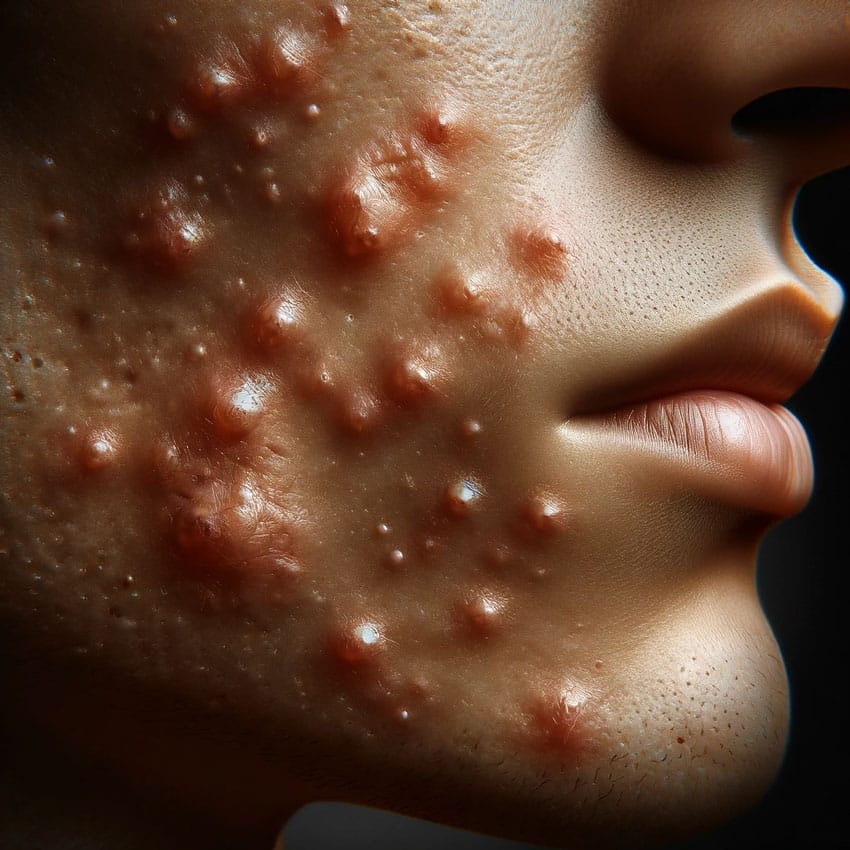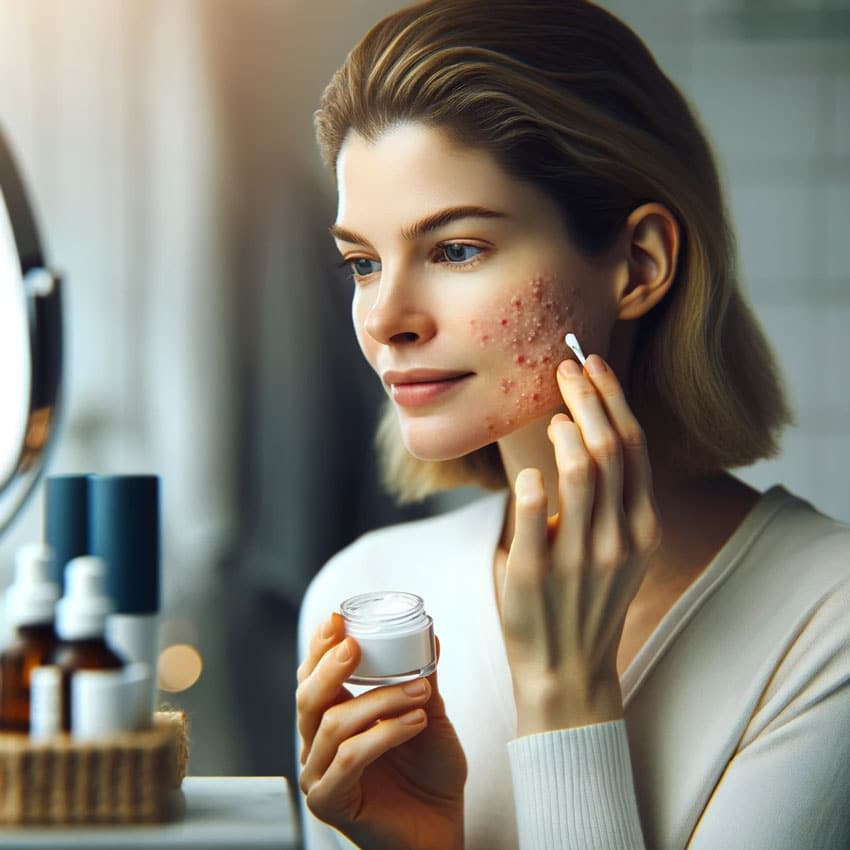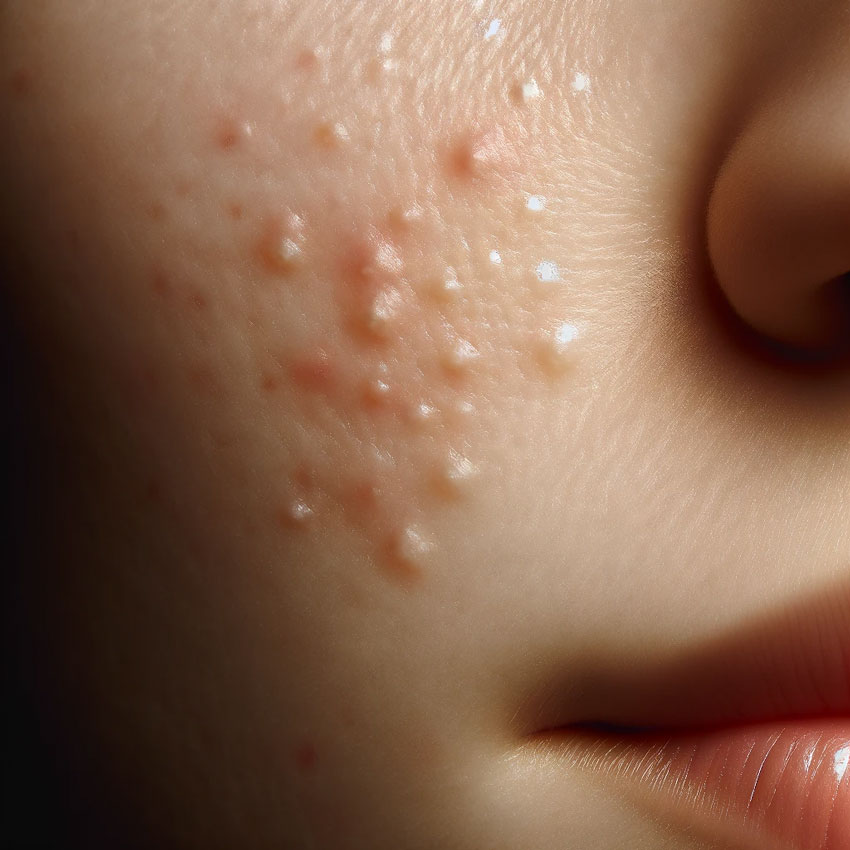Acne scars can be a frustrating and embarrassing reminder of past breakouts.
While many treatments are available to reduce the appearance of scars, they can be expensive and may not work for everyone.
Fortunately, there are also natural remedies that can help fade acne scars without breaking the bank.
Understanding Acne and Acne Scars
Acne is a common skin condition that affects millions of people worldwide. It occurs when the hair follicles become clogged with oil and dead skin cells, leading to the formation of pimples, blackheads, and whiteheads.
Acne can be caused by a variety of factors, including hormones, genetics, and certain medications.
While acne itself can be frustrating and uncomfortable, it can also lead to the development of acne scars. Acne scars are the result of inflammation caused by acne, which can damage the skin and lead to raised scars, discoloration, and other types of damage.
There are several different types of acne scars, including atrophic scars, which are depressed scars that occur when the skin is unable to regenerate properly, and hypertrophic scars, which are raised scars that occur when the skin produces too much collagen during the healing process.
There are also different types of acne scars based on their appearance, such as rolling scars, which are shallow scars with sloping edges, and ice pick scars, which are deep and narrow scars that resemble small puncture wounds.
It’s important to note that not all acne scars are the same, and different types of scars may require different treatments. Additionally, some people may be more prone to developing acne scars than others, depending on factors such as their skin type and the severity of their acne.

Natural Remedies for Acne Scars
Acne scars can be a frustrating and unsightly reminder of past breakouts. While there are many treatments available, some people prefer natural remedies for their acne scars. Here are some natural remedies that may help reduce the appearance of acne scars.
Kitchen Ingredients
- Aloe Vera: Aloe vera has anti-inflammatory and soothing properties that can help reduce the appearance of acne scars. Apply aloe vera gel directly to the affected area and leave it on for 30 minutes before rinsing it off with water.
- Honey: Honey is a natural moisturizer and has antibacterial properties that can help heal acne scars. Apply raw honey to the affected area and leave it on for 10-15 minutes before rinsing it off with water.
- Apple Cider Vinegar: Apple cider vinegar has natural alpha-hydroxy acids that can help exfoliate the skin and reduce the appearance of acne scars. Mix apple cider vinegar and water in equal parts and apply it to the affected area with a cotton ball. Leave it on for 5-10 minutes before rinsing it with water.
- Lemon Juice: Lemon juice has natural bleaching properties that can help lighten acne scars. Apply fresh lemon juice to the affected area with a cotton ball and leave it on for 10-15 minutes before rinsing it off with water.
- Green Tea: Green tea has antioxidants that can help reduce inflammation and promote healing. Brew a cup of green tea and let it cool. Apply it to the affected area with a cotton ball and leave it on for 10-15 minutes before rinsing it with water.
Essential Oils
- Citric Acid: Citric acid is a natural exfoliant that can help reduce the appearance of acne scars. Mix equal parts citric acid and water and apply it to the affected area with a cotton ball. Leave it on for 5-10 minutes before rinsing it with water.
- Manuka Honey: Manuka honey has antibacterial and anti-inflammatory properties that can help heal acne scars. Apply manuka honey directly to the affected area and leave it on for 30 minutes before rinsing it off with water.
- Tea Tree Oil: Tea tree oil has antimicrobial and anti-inflammatory properties that can help reduce the appearance of acne scars. Mix a few drops of tea tree oil with a carrier oil, such as coconut oil, and apply it to the affected area. Leave it on for 10-15 minutes before rinsing it with water.
- Baking Soda: Baking soda has natural exfoliating properties that can help reduce the appearance of acne scars. Mix equal parts baking soda and water and apply it to the affected area with a cotton ball. Leave it on for 5-10 minutes before rinsing it with water.
These natural remedies may help reduce the appearance of acne scars, but it’s important to remember that everyone’s skin is different. It’s always a good idea to do a patch test before trying any new natural remedies. If you have severe acne scars, it’s best to consult a dermatologist for the most effective treatment options.

Over-The-Counter Treatments
When it comes to removing acne scars, there are a variety of over-the-counter treatments available. These treatments are generally affordable and easy to use, making them a popular choice for many people. Here are some of the most effective over-the-counter treatments for acne scars:
Creams and Lotions
One of the most common types of over-the-counter treatments for acne scars is creams and lotions. These products typically contain ingredients like salicylic acid, benzoyl peroxide, retinol, and alpha hydroxy acids.
These ingredients work by exfoliating the skin, reducing inflammation, and promoting collagen production.
Some of the most popular creams and lotions for acne scars include Mederma Scar Cream Plus, Bio-Oil, and Neutrogena Rapid Wrinkle Repair Retinol Oil. These products can be applied directly to the affected area and are typically used once or twice a day.
Peels and Masks
Another popular type of over-the-counter treatment for acne scars is peels and masks. These products contain ingredients like glycolic acid and salicylic acid, which work by exfoliating the skin and promoting cell turnover.
Some popular options include The Ordinary AHA 30% + BHA 2% Peeling Solution and the Aztec Secret Indian Healing Clay Mask. These products are typically applied to the skin for a set amount of time before being washed off.

Professional Treatments for Acne Scars
When natural remedies and over-the-counter treatments fail, professional treatments for acne scars may be necessary. A dermatologist can recommend the best course of action based on the severity and type of acne scars. Professional treatments can range from minimally invasive procedures to surgical options.
Dermatological Procedures
Dermabrasion is a procedure that involves removing the top layer of skin with a rapidly rotating brush or other device. This treatment is usually reserved for more severe scarring, but it can be effective in removing surface scars and making deeper acne scars less noticeable. However, potentially severe side effects include scarring and changes in skin color.
Microdermabrasion is a less invasive option that uses a special device to gently remove the outer layer of skin. This treatment can improve the appearance of mild to moderate acne scars, but it may require multiple sessions for optimal results.
Chemical peels involve applying a chemical solution to the skin to remove the top layer of damaged skin. This treatment can be effective for treating mild to moderate acne scars, but it can also cause redness, swelling, and peeling.
Surgical Options
Subcision is a surgical option that involves using a needle to break up scar tissue and stimulate collagen production. This treatment can be effective for treating rolling acne scars, but it may require multiple sessions for optimal results.
Fillers and injections are another option for treating acne scars. These treatments involve injecting a substance, such as hyaluronic acid or corticosteroids, into the scar to plump it up and make it less noticeable. Results are temporary and may require repeat treatments.
Laser resurfacing is a procedure that uses a laser to remove the top layer of skin and stimulate collagen production. This treatment can be effective for treating moderate to severe acne scars, but it may require multiple sessions for optimal results.
Surgery is a last resort option for treating acne scars. This treatment involves cutting out the scar tissue and stitching the skin back together. This option is typically reserved for deep, severe scars that cannot be treated with other methods.

Prevention and Maintenance
Preventing acne scars from forming in the first place is the best approach. Here are some tips to help prevent acne and reduce the risk of scarring:
- Sunscreen: Always wear sunscreen when going outside, as sun exposure can darken existing scars and make them more noticeable. Look for non-comedogenic, oil-free, and fragrance-free options.
- Irritation and Breakouts: Avoid touching or picking at acne, as this can lead to scarring. Use gentle, non-comedogenic products and avoid harsh scrubs or exfoliants that can irritate the skin.
- Sensitive Skin: Those with sensitive skin may benefit from using organic or natural products that are free from synthetic fragrances and harsh chemicals.
- Dryness: Moisturize daily to keep skin hydrated and help prevent scarring. Look for non-comedogenic, oil-free, and fragrance-free options.
- Makeup: Use non-comedogenic, oil-free, and fragrance-free makeup. Avoid heavy coverage or thick foundations that can clog pores and cause breakouts.
- Toner: Use toner to help balance the skin’s pH levels and remove any remaining dirt or oil after cleansing.
- Acne Treatments: Use acne treatments as directed to help prevent breakouts and reduce the risk of scarring.
- Diet: Eating a healthy diet rich in fruits, vegetables, and whole grains can help promote clear skin. Avoid processed and sugary foods that can contribute to acne.
- Stress: Manage stress through exercise, meditation, or other relaxation techniques. Stress can trigger acne breakouts and make existing acne worse.
- Face Masks: Use face masks to help unclog pores and remove excess oil. Look for masks with ingredients like zinc, polyphenols, or other natural ingredients.
- Medications: Certain medications, such as steroids or anticonvulsants, can contribute to acne and scarring. Talk to a healthcare provider about alternative options if necessary.
- Scar Treatments: Consider scar treatments like microdermabrasion kits, poly-lactic acid, or silicone sheets. These treatments can help reduce the appearance of scars over time.

